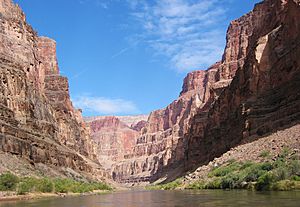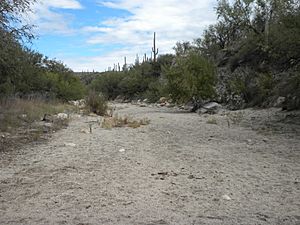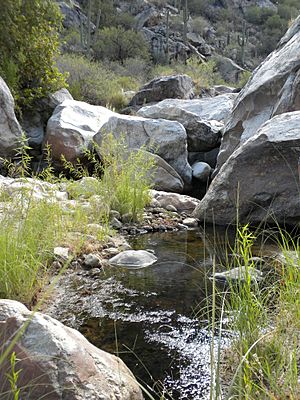List of fishes native to Arizona facts for kids
The native fishes of Arizona are special kinds of freshwater fish. They are found naturally in the rivers, streams, and lakes across Arizona, United States. These fish have lived in Arizona's waters for thousands of years.
Where Arizona's Native Fish Live
Arizona has many different types of weather, from very hot and dry deserts to cold, snowy mountains. Because of this, the places where Arizona's native fish live are also very different. Most of these fish live in flowing rivers and streams. The biggest river in Arizona is the Colorado River. Many smaller rivers, like the Gila River and the Little Colorado River, flow into it.
For a very long time, Arizona's native fish have learned to live in all sorts of watery places. This includes tiny springs and the powerful, fast-moving Colorado River. They are amazing because they can survive both long dry periods and sudden, strong floods. This ability has helped them stay alive for ages!
However, these fish have had a harder time dealing with changes made by people. When their homes (habitats) are lost or changed, and when new types of fish are brought in, the native fish populations drop a lot. Sadly, one species of native fish is already gone forever (extinct). More than 70% of them are now considered "Wildlife of Special Concern" in Arizona. Over half are listed by the government as endangered (meaning they are in danger of disappearing) or threatened (meaning they might become endangered soon). This means a very special part of Arizona's nature could be lost if we don't help them.
Many smaller rivers and creeks in Arizona are now dry for most of the year. They only have water after heavy rains. This is partly because people pump water from underground (aquifers) and because there's less water flowing in streams. Also, non-native fish, like the green sunfish, sometimes eat the native fish.
The Arizona Game and Fish Department works hard to protect these native fish. Many other government groups, conservation organizations, and even regular people are helping too. They want to make sure these fish survive for future generations. For example, the San Bernardino Ranch is trying to bring new fish back into Arizona's waters. Other projects focus on protecting the fish's homes on federal lands. A big reason for the decline of native fish is the loss of wetlands and areas along rivers. This loss is due to farming, water being used up, digging, and flood control projects.
Many lakes and ponds also provide quiet water homes for fish. These can range from cold mountain lakes to warm desert pools. The biggest lakes in Arizona are Lake Powell, Lake Mead, Lake Mohave, and Lake Havasu. All of these were made by building dams on the Colorado River. Smaller lakes and reservoirs are often found in higher, cooler areas and are sometimes used for fun activities like boating.
How Native Fish Are Protected
The United States government has a law called the U.S. Endangered Species Act of 1973. This law helps protect animals and plants that are in danger of disappearing. Here is a list of Arizona's native fish and their protection status under this important law.
| Binomial nomenclature | Common name | Protection status |
|---|---|---|
| Agosia chrysogaster chrysogaster | Longfin Dace | Not protected |
| Agosia chrysogaster sp 1 | Yaqui Longfin Dace | Not protected |
| Campostoma ornatum | Mexican Stoneroller | Not protected |
| Catostomus benardini | Yaqui Sucker | Not protected |
| Catostomus clarki | Desert Sucker | Not protected |
| Catostomus discobolus | Bluehead Sucker | Not protected |
| Catostomus discobolus yarrowi | Zuni Bluehead Sucker | Endangered |
| Catostomus insignis | Sonora Sucker | Not protected |
| Catostomus latipinnis | Flannelmouth Sucker | Not protected |
| Catostomus sp. 3 | Little Colorado River Sucker | Not protected |
| Cyprinella formosa | Beautiful Shiner | Threatened |
| Cyprinodon arcuatus | Santa Cruz Pupfish | Extinct |
| Cyprinodon eremus | Rio Sonoyta Pupfish | Endangered |
| Cyprinodon macularius | Desert Pupfish | Endangered |
| Elops affinis | Pacific Tenpounder or Machete | Not protected |
| Gila cypha | Humpback Chub | Endangered |
| Gila ditaenia | Sonora Chub | Threatened |
| Gila elegans | Bonytail Chub | Endangered |
| Gila intermedia | Gila Chub | Endangered |
| Gila nigra | Headwater Chub | Not protected/candidate |
| Gila purpurea | Yaqui Chub | Endangered |
| Gila robusta | Roundtail Chub | Not protected/candidate |
| Gila seminuda | Virgin Chub | Endangered |
| Ictalurus pricei | Yaqui Catfish | Threatened |
| Lepidomeda mollispinis mollispinis | Virgin Spinedace | Not protected |
| Lepidomeda vittata | Little Colorado River Spinedace | Threatened |
| Meda fulgida | Spikedace | Endangered |
| Mugil cephalus | Striped Mullet | Not protected |
| Oncorhynchus apache | Apache Trout | Threatened |
| Oncorhyncus gilae | Gila Trout | Threatened |
| Plagopterus argentissimus | Woundfin | Endangered |
| Poeciliopsis occidentalis occidentalis | Gila Topminnow | Endangered |
| Poeciliopsis occidentalis sonorensis | Yaqui Topminnow | Endangered |
| Ptychcheilus lucius | Colorado Pikeminnow | Endangered |
| Rhinichthys osculus | Speckled Dace | Not protected |
| Tiaroga cobitis | Loach Minnow | Endangered |
| Xyrauchen texanus | Razorback Sucker | Endangered |
See also
 In Spanish: Peces nativos de Arizona para niños
In Spanish: Peces nativos de Arizona para niños




